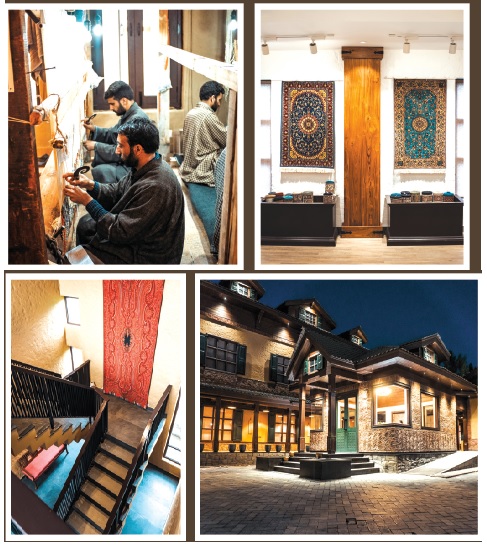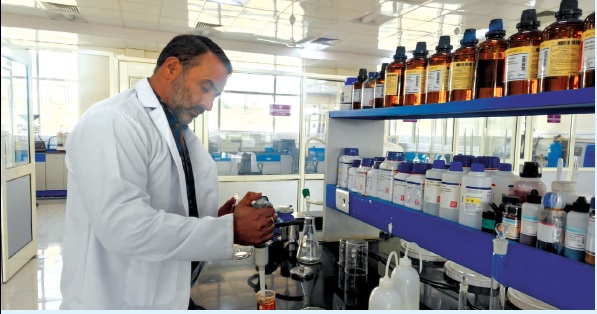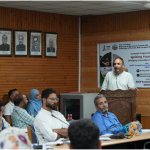It the late 1960s, there used to be a privately owned Karkhana (a workplace or factory) for carpet artisans in Takia Batpora village in Kunzer area of Tangmarg in northern Kashmir.
It was then a weaving learning centre where artisans learned carpet weaving. It is still popularly known as the Karkhana. However, due to the disturbances in the later decades, in late 1990s the building was closed and artisans stopped going there. The old building had to be dismantled due to road widening.
Few years ago, Ali Shah family from Srinagar, who are into carpet business, took an initiative to construct a new building on the theme of the old one, revived it and turned it into an art and culture centre and named it Artisane.
Located on the Srinagar-Gulmarg highway, they replicated traditional material, architect in the new building, which was finally opened as a culture centre in January this year.
The first-of-its-kind art and cultural centre is aimed not only to showcase the region’s handicrafts and culture, but also to provide a sustainable source of livelihood to artisans and weavers.
The two-floor building has been divided into two sections, one is the gallery section and other a weaving section where artisans come and learn different kinds of arts and handicrafts.
Mehboob Iqbal Shah, one of the co-founders of the art centre said it is the only art and culture centre in Kashmir that reflects Kashmir’s rich art and culture.
“It is a place where one will come to know about the traditional arts and crafts, because lot of misbranding is happening with Kashmiri handicrafts in the market. So, we wanted to nip the evil in the bud and create a space where one will see the difference,” he said.
The traditional handmade products that have been saved in the gallery of the building is Papier-mâché, walnut woodcarving, hand-knit carpets, wool, silk, shawl, namda, copper and other traditional products of Kashmir culture.
“There are many artisans who reside in nearby villages and they come here to learn the sozni embroidery, shawl weaving, carpet weaving, kani shawl weaving etc.,” he said.
Artisans can also sell their products through the facility itself. They work directly with the place. Around 300 artisans from different areas of Kashmir are associated with Artisane.
“We pay them good stipend. What they produce, we also buy that. There are also carpet artisans, pashmina artists, kani shawl makers. So whenever somebody visits this place they get to know the real picture of arts and crafts in Kashmir. This was the vision behind this initiative, because we never had such an art and culture centre in Kashmir,” he said.
Shah said to motivate and keep the artisans attracted, they provide the best facilities and a decent workspace and enjoy working there.
“Artists need glorification. They need respect. There is lot of social taboos regarding artisans. They deserved much more than they are getting. They are real heroes. When they are on the loom we are surviving,” he said.
The centre has now become a preferred place and centre of attraction for lot of people including Bollywood celebrities and tourists going to Gulmarg, Tangmarg and Drung.
Many Bollywood celebrities including Neelam Kothari Soni, Indian Film Actress, Sameer Soni, Indian Film Actor, Daler Mehndi, Indian Music Maestro, and others have visited this place.
“Tourists stop there and have a look at the building. They get mesmerized by the artwork saved there and the hand-woven products. People can have glimpse of the past and the present. People can relate the handicrafts and relate it with the history,” he said.
“We have pashmina weavers from Fateh Kadal, who are reputed and renowned for their skills. Similarly, artisans from Kashmir’s First Handloom village Kanihama have been roped in for the weaving of Kani shawls. We want to keep it simple, pure, and perfect,” Shah said.
At the centre, one can not only purchase Kashmir’s valued handicraft like Kani and Pashmina shawls, silk carpets, sozni embroidery work, but also see a live demonstration of how these products are made.
The motive is not only promotion of products, but giving due respect to weavers and craftspeople, who have so far remained behind the scene.
Recently, Artisane organized a rare felicitation program titled Karigar-e-Zaman, to put a spotlight on the invisible hands and little-known faces behind the masterpieces created over decades in Kashmir.
“It was aimed not only to connect artisans and felicitate them, but also a move towards their upliftment. We gave them a space to talk about their life and spirit,” he said.
Shah added that at the centre, if somebody wants to get the training they will be more than happy to felicitate that.
The centre is also planning a number of initiatives like a program under Pochar (harnessing) titled “each one teach one” meant for skill development.
“To start, we will shortlist craftsmen each one of them will teach their craft to at least one person and we will provide stipend to persons who teach and also to those who learn,” he said.
Annually, they are also planning a grand program to invite artisans and celebrate their stories under Karigar-e-Zaman (master craftsman)
During the summers, the centre is planning to start a café and also organize cultural musical evenings, where they will invite young artists and musicians.
Artisane founders are using social media and other mediums in order to promote art, culture and attract tourists.
Shah said that in Europe and other foreign countries, artists are highly respected people but in Kashmir artists do not get the status they deserve.
In several parts of the world, Kashmiri handicrafts and arts including carpet, pashmina, Kani shawl and other products are famous for their unique quality.
“Artists are the biggest ambassadors of our culture. Art and craft is the first identity of any place or culture. They play a huge role in Kashmiri identity all around the world,” he said.








